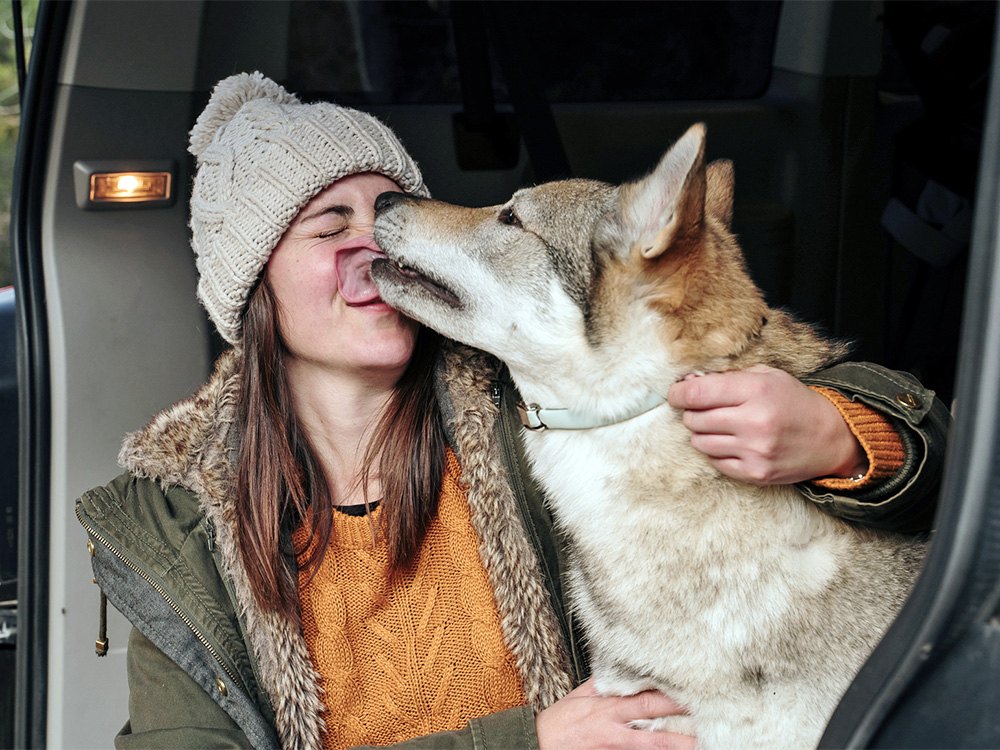Letting Your Dog Lick Your Face Could Be Dangerous, New Study Finds · Kinship Leave a comment
When you’re used to letting your pup lick your face — and possibly even your mouth, to a few of your pals’ horror — you’re removed from alone. Most pet dad and mom have a tough time resisting these affectionate “kisses” their canine bestow…even when they understand it’s somewhat gross. However now, scientists are warning that every one that pet saliva could possibly be severely harmful. A brand new researchopens in a brand new tab discovered that family canine are sometimes ignored transmitters of salmonella.
Researchers at Penn State College (PSU) discovered that canine can carry antibiotic-resistant Salmonellaopens in a brand new tab, which poses a severe danger to people; in each canine and people, salmonella infections may cause fever, nausea, diarrhea, abdomen cramps, and extra uncomfortable signs. In some circumstances, in accordance with the Mayo Clinic,opens in a brand new tab the an infection can unfold past the intestines and trigger extra severe problems.
Get (completely free) offers for meals, treats, equipment, tech, and method extra pet parenting must-haves.
Get Offers
opens in a brand new tab
Canine can turn out to be sick with salmonella from publicity to the micro organism, usually by means of consuming uncooked meals or (sorry) consuming feces from contaminated animals. Salmonella may be unfold to people by means of by means of contact with canine’ stool or saliva, the U.S. Meals and Drug Administration warns. opens in a brand new tabAnd canine aren’t at all times symptomatic whereas carrying salmonella, which means that pups could unfold it to people with none warning indicators.
The PSU workforce analyzed salmonella strains present in family canine between Could 2017 and March 2023, in addition to human salmonella strains recorded by the Nationwide Institute of Well being. They discovered 87 circumstances of salmonella in canine, and so they concluded that 77 circumstances of salmonella in people could have come from contact with canine. Every pressure recognized in canine possessed antimicrobial resistance genes for medicine really useful by the World Well being Group.
The researchers additionally discovered that 39 % of the samples taken from canine contained a gene that permits Salmonella to outlive within the canine’ intestines. Which means even after the sickness passes, they’ll proceed to transmit salmonella by means of their feces.
The research’s authors add that, though salmonella will not be frequent in canine, people’ proximity to canine makes their findings notable. “Particularly with Salmonella, we take into consideration the position of agriculture and transmission — we take into consideration eggs, we take into consideration beef. However the factor is, we don’t let cows sleep in our beds or lick our faces, however we do canine,” Sophia Kenney, the research’s lead writer, mentioned in an announcement.opens in a brand new tab
Nkuchia M’ikanatha, a co-author of the research, provides that hygiene practices may help forestall the unfold of salmonella. “This reminds us that straightforward hygiene practices reminiscent of hand washing are wanted to guard each our furry mates and ourselves — our canine are household however even the healthiest pup can carry Salmonella,” M’ikanatha mentioned.
Correct hygiene measures embrace washing fingers ceaselessly, commonly cleansing pet bowls, washing fingers after dealing with canine toys and beds, and — sure, sorry — avoiding letting your pup lick your face. “A number of research spotlight the numerous bodily and psychological well being advantages of proudly owning a canine, together with lowered stress and elevated bodily exercise,” Erika Gandaopens in a brand new tab, one other co-author, added. “Our objective is to not discourage pet possession however to make sure that individuals are conscious of potential dangers and take easy steps, like working towards good hygiene, to maintain each their households and their furry companions protected.”


